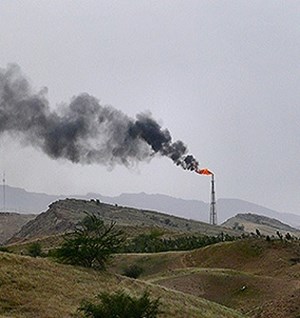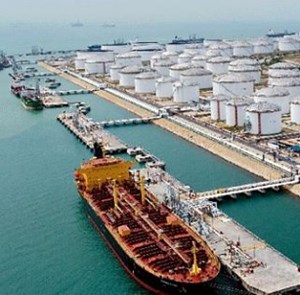Hopes for Iran deal fade just when the world needs oil most
(Bloomberg) — Two months after negotiators left Vienna, expectations are fading that Iran nuclear talks will resume, leaving the world with the remains of an agreement no one’s willing to pronounce dead.
A media tent erected in anticipation of a grand announcement has been quietly dismantled, showy multilateral pow-wows in the Austrian capital giving way to furtive messages exchanged between the US and Iran via the European coordinator.
European Union envoy Enrique Mora is in Tehran this week for a last-ditch effort to revive the landmark 2015 accord, which curbed Iran’s nuclear activities in return for sanctions relief, including on oil. The ruler of Qatar, a Gulf Arab state which enjoys unusually good ties with Iran, also arrives Thursday in a bid to lend new momentum to the process.
Hopes are not high.
Four officials, who asked not to be identified so they could speak freely, said Mora’s visit was unlikely to yield a breakthrough.
Political Cost
President Joe Biden, once optimistic he could revive the multinational accord abandoned by Donald Trump in 2018, now faces the possibility that he won’t get it done -- at least not before mid-term elections taking place in six months where Republicans would be sure to portray any deal as a cave-in to Iran.
Negotiators came tantalizingly close to a breakthrough before Russia’s invasion of Ukraine reshuffled the geopolitical deck and reduced the incentives for compromise on both sides, according to two European diplomats.
Talks have since been stuck over Iran’s demand that the US remove the Iranian Revolutionary Guard Corps from its list of terrorist organizations.
A bipartisan majority warned the White House last week that Congress is opposed to lifting sanctions on the IRGC. It’s a message Biden can scarcely afford ignore as Democrats face the possibility of losing their Congressional majority.
For Iran, $100 oil has mitigated the urgency to secure sanctions relief. Crude prices have almost doubled since talks began a year ago.
Iran also increased exports of oil and refined fuel by almost a third to 870,000 barrels per day in the first quarter, according to commodity data firm Kpler. Most goes to allies such as China and Venezuela who don’t need to worry about secondary US sanctions.
In the last month, Iran’s announced a military-cooperation deal with China and a long-term food-supply contract with Russia -- both parties to the nuclear deal.
Iranian officials said last month they’d only reconvene in Vienna to finalize the accord -- something that looks improbable unless the two sides can agree on the IRGC designation and a handful of other politically-fraught issues that are not part of the text itself.
Looming Limbo
With talks stuck, diplomats say extending the state of limbo is their best hope to avoid escalation.
For now, European parties to the multilateral accord won’t declare it dead because that could force the United Nations to snap back international sanctions, taking more Iranian oil off the market just as soaring energy prices threaten to derail the global economic recovery.
That, in turn, could lead to a resumption of tit-for-tat attacks on Middle East shipping lanes and energy infrastructure -- risking another military conflict while the world is still grappling with the fallout of Russia’s war on Ukraine.
Oil traders and analysts who’d predicted a deal would bring Iranian oil back onto global markets, are no longer factoring in those barrels. JPMorgan Chase & Co. cut its global supply assumption for this year by 400,000 barrels a day and for next year by 1 million barrels a day.
“We now expect Iranian crude production and exports to remain at current levels for the foreseeable future,” analysts including Natasha Kaneva wrote in a May 4 note.
Fade Away
It’s an anticlimactic turn for talks launched with high hopes after Biden took office last year, promising to make good on his campaign pledge to reinstate the agreement.
Failure to revive the deal would add to a list of frustrated goals at home and abroad.
Where Tehran’s highly-publicized release of two British detainees in March added to expectations that a breakthrough was near, the arrest of two French nationals this week has soured the mood.
While not directly linked to the nuclear file, Iran’s arrest of foreign nationals is widely read by diplomats as an effort to boost leverage at the negotiating table.
A U.S. official said it was premature to write off the deal, but acknowledged the process wasn’t moving in the right direction.
He said the Biden administration would pursue a diplomatic path with Iran so long as it remains in U.S. interests to restore the agreement. A time would come when that’s no longer the case, but Biden has not decided that yet.
Atomic Advances
With the deal in limbo, Iran has continued enriching uranium beyond agreed limits, gaining knowledge of a suite of technologies to which the pact once prevented access.
That accumulation of know-how has prompted US officials to warn since July that a failure to restore compliance quickly could render the original provisions obsolete.
“The international community cannot afford not to close the nuclear deal with Iran,” said Emilia Jose Peña Ruiz, a Spanish policy adviser who’s written extensively about how Iran’s energy reserves add weight to its negotiating power. “If such an agreement is not reached, we could have another nuclear actor of the North Korea type.”
While Iran has always asserted it doesn’t want to follow Pyonyang’s path to nuclear weapons, the 2015 nuclear agreement was formulated to assuage international doubts.
One of the European diplomats said Tehran may calculate that exercising some voluntary restraint could allow it to continue nuclear work beyond the scope of the agreement while maintaining it on life support.
Iran said in December it wouldn’t enrich uranium to levels needed for a bomb. It subsequently rendered part of its inventory of highly-enriched uranium unsuitable for that purpose.
International Atomic Energy Agency monitors continue to check activities and stockpiles at Iran’s primary enrichment facilities.
Secret Sites
But it’s concern over potential secret activity that’s changing the tone.
The UN nuclear watchdog is scheduled to report next month on the results of a two-year probe into the source of uranium particles detected at several undeclared sites. A deal’s unlikely until that investigation is settled.
“It’s hard to be optimistic,” said Ali Vaez, Director of the Iran Project at the Washington-based International Crisis Group. “The option is not between a deal now or a deal six months from now. It’s between a deal now or a deal six years from now.”




